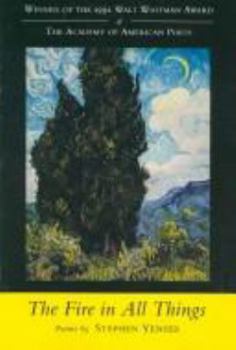The Fire in All Things: Poems
(Part of the Walt Whitman Award of the Academy of American Poets Series)
Select Format
Select Condition 
Book Overview
Selected by Richard Howard from almost one thousand entries, Stephen Yenser's The Fire in All Things is the most recent recipient of the Walt Whitman Award, given annually by The Academy of American... This description may be from another edition of this product.
Format:Hardcover
Language:English
ISBN:0807118273
ISBN13:9780807118276
Release Date:January 1993
Publisher:LSU Press
Length:64 Pages
Weight:0.70 lbs.
Dimensions:0.5" x 6.4" x 9.3"
Customer Reviews
2 ratings
Yenser and Sound
Published by Thriftbooks.com User , 24 years ago
I listened to Yenser read his poetry from The Fire in All Things a couple of weeks ago here at the University of Michigan, and realized his dedication to sound in writing. Yenser's Keats-like implementation of sound never fails to keep his poems innovative and tightly wound. Except for "Fundamental, the poems in the Clos Camardon section are broken into three stanzas, a form that could have easily become dull had Yenser not kept each poem edgy through his unique approach to rhyme and alliteration. In "Reconnaissance," Yenser plays with the consonant sound "c." "Camouflage's" sound, besides its literal implications, hints at how Yenser later hides the hard k sound in "firecrackers" and "fractured." His return to placing it at the beginning of a word in "crackling" then becomes both refreshing and well earned. "Sentence" repeats rhyme without it ever sounding forced. "Eternal" is rhymed not only with "internal" but with such rarely used words as "hibernal" and "kernel," as the poem challenges its own idea of recurrence through sound. Each stanza stays close to its predecessor, its first line rhyming with the last of the stanza it follows. Besides causing these tensions, Yenser's attention to all the ways sound can work always keeps the reader's tongue and ears awake. Extending this idea of wakefulness, the first section of poems concludes with "Ember Week, Reseda" where Yenser creatively ends with the phrase "falling awake." Tying this in with the sounds heard in so simple a word as week (Yenser considers all three, the "w", "ee," and "k"), one sees how Yenser is always tweaking words (only the vowel sound is different in "awake"). Most impressive and pleasing is how Yenser addresses sound seemingly with little effort-the reader usually pleasantly stumbles upon his small modifications. "Carnal Knowledge" was another way in which Yenser complemented his poem's idea (or perhaps more accurately, complicated it) through sound. Leroy's coarseness is reflected in rhyme, the first stanza's perfect a, b, a, b, scheme being proof positive. But then there is the off rhyme of "ebony" with "way," and Yenser is off to playing his sound game once again. That small disagreement in sound (in the second and fourth lines) is then somewhat balanced by stanza four's "pour" and "sour" (which instead occur in lines one and three). Again, placement is Yenser's key. In the poem's fourth to last stanza's rhyming, the technique is perhaps best when "precise" exactly rhymes with "slice" while the crude comparison of a "hose" with an "esophagus" is made even more sickening by their close-but-not-quite sounds. In "Vertumnal," I am still confused by but nonetheless engaged in how he uses the "ch" sound in combination with vowels, as in "branch," "finch," and "bench." I want to say he has made the "defunct vineyard" he described at the reading all the more lively by playing with a single syllable word and its sounds. Wh
in the oral tradition
Published by Thriftbooks.com User , 24 years ago
Stephen Yenser's collection of poetry, _The Fire in All Things_, is a book of sound and form. The poet toys with common sayings and typical syntax to challenge his readers, to make them stop and think to find meaning. At times his work is quite funny, while powerful and elegiac at others. Yenser's poems often contain great detail, especially the details of people and places; by the end of the book, we come to know well the settings and characters of Yenser's life. He pays close attention to sound, using alliteration and assonance rampantly in the poetry, though it is not always noticed easily on the page. Yenser's poetry is clearly meant to be read aloud; so much pleasure can be extracted from the experience of this book by hearing it.






